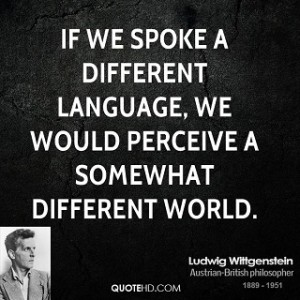Note on Linguistics as it Applies to the Subject of Sustainability

This is a very interesting assertion, but I’ve never found it compelling. There are potential thoughts and feelings that are unavailable to us because we don’t have words for them? It seems more likely that we make up words that describe new objects and feelings, and thus one does not limit the other.
In any case, here’s an excerpt from an old post that gets at the concept of language as it applies to our thoughts about sustainability.
The other day, I wrote a comment on an article that dealt with the sustainability of dog ownership, in response to which someone pointed out: I guess it depends on how you define “sustainability.”
True, it may be hard, or even impossible, to work out a precise definition of “sustainable” that applies in all cases. In fact, a number of people have suggested that we stop using the term altogether simply because it means so many different things in various contexts.
I totally disagree with this latter idea.
No better word in the English language exists to communicate the idea here, though, obviously, if you want to pick nits on the subject, you won’t get anywhere at all. We can all agree that sustainable processes are those that, a) can be continued indefinitely though time, b) result in a minimum of toxic byproducts, c) don’t abuse or exploit members of the human race, d) don’t pose a constant drain on finite natural resources without a way to replenish them and, e) don’t cause unacceptable amounts of damage elsewhere in the ecosystem.
I just wrote this off the top of my head, and I’m sure there are more complete, elegant, and unassailable ways of expressing the idea. In fact, it may sound like a lot of words for such a simple concept, but consider an example. What if I told you that I had a way to raise and catch wild tuna that was minimally polluting and left the tuna population essentially unchanged? You might say that this was by definition “sustainable,” until I admitted that it would wipe out 90% of the seal population in a matter of a few decades, or that it posed incredible safety risks to fishermen, at which you’d be forced to admit that my plan is not really “sustainable” in any meaningful way.
Again, not to be cavalier, but I think the intention of the term, as it’s commonly used by thoughtful people who honestly care about the subject, is completely clear.

In some cases, language and the available words do limit thinking. I read about an area in Africa where the people had difficulty understanding logic because their language did not support the concept of “if then else”. No doubt such limitations can be overcome with effort.
Hi Craig,
You and your readers might really enjoy this RadioLab program on the relationship between words and thought.
By the way, Craig, I found the information particularly intriguing and compelling, given my family’s longstanding endeavors (with which you are well acquainted).
Here’s a link: http://www.radiolab.org/story/91725-words/